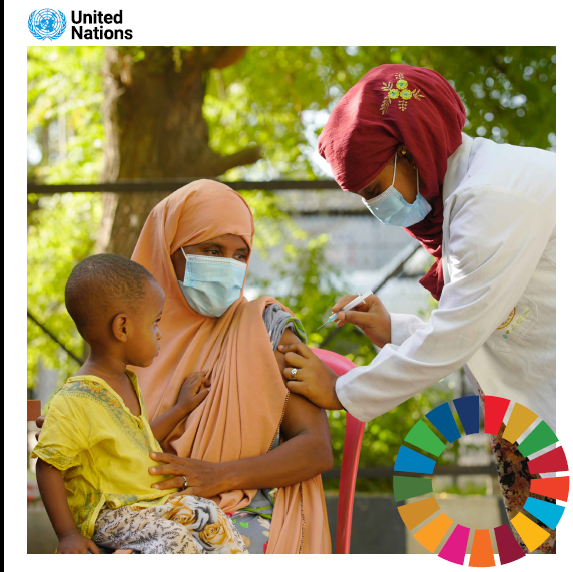Foreword The global community is at a critical moment in its pursuit of the Sustainable Development Goals (SDGs). More than a year into the global pandemic, millions of lives have been lost, the human and economic toll has been unprecedented and recovery efforts so far have been uneven, inequitable and insufficiently geared towards achieving sustainable development. The current crisis is threatening decades of development gains, further delaying the urgent transition to greener, more inclusive economies, and throwing progress on the SDGs even further off track. Had the paradigm shift envisioned by the 2030 Agenda for Sustainable Development been fully embraced over the past six years, the world would have been better-prepared to face this crisis – with stronger health systems, expanded social protection coverage, the resilience that comes from more equal societies, and a healthier natural environment. Regrettably, the SDGs were already off track even before COVID-19 emerged. Progress had been made in poverty reduction, maternal and child health, access to electricity, and gender equality, but not enough to achieve the Goals by 2030. In other vital areas, including reducing inequality, lowering carbon emissions and tackling hunger, progress had either stalled or reversed. As the pandemic continues to unfold, the Sustainable Development Goals Report 2021 outlines some significant impacts in many areas that are already apparent. The global extreme poverty rate rose for the first time in over 20 years, and 119 to 124 million people were pushed back into extreme poverty in 2020. There is a risk of a generational catastrophe regarding schooling, where an additional 101 million children have fallen below the minimum reading proficiency level, potentially wiping out two decades of education gains. Women have faced increased domestic violence, child marriage is projected to rise after a decline in recent years, and unpaid and underpaid care work is increasingly and disproportionately falling on the shoulders of women and girls, impacting educational and income opportunities and health. Notwithstanding the global economic slowdown, concentrations of major greenhouse gases continue to increase. With the global average temperature reaching about 1.2°C above pre-industrial levels, the climate crisis has well and truly arrived, and its impacts are being felt across the world. The pandemic has also brought immense financial challenges, especially for developing countries – with a significant rise in debt distress and dramatic decreases in foreign direct investment and trade. Yet, with a surge in global solidarity and leadership from the highest political level, countries can still deliver on the 2030 Agenda and the 2015 Paris Agreement on Climate Change. A global vaccination plan, designed and implemented by the countries that can produce vaccines today or will be able to do so if properly supported, is an urgent first step in that direction. A recommitment by Governments, cities, businesses, and industries to ensure that the recovery reduces carbon emissions, conserves natural resources, creates better jobs, advances gender equality and tackles growing poverty and inequalities is a further imperative. As this report shows, the availability of high-quality data is also critical, helping decision makers to understand where investments can have the greatest impact; but improved data collection will not happen without increased data financing, from both international and domestic resources. The challenges are immense, but there are also reasons for hope. The COVID-19 crisis demonstrated inspiring community resilience, highlighted the herculean work by essential workers in myriad fields and facilitated the rapid expansion of social protection, the acceleration of digital transformation and unprecedented worldwide collaboration on the development of vaccines. A brighter future is possible. We must use the crisis to transform our world, deliver on the 2030 Agenda and keep our promise to current and future generations. António GuterresSecretary-General, United Nations View from the pandemic: stark realities, critical choices As we enter the second year of the COVID-19 pandemic, it is abundantly clear that this is a crisis of monumental proportions, with catastrophic effects on people’s lives and livelihoods and on efforts to realize the 2030 Agenda for Sustainable Development. Historically, pandemics have served as catalysts for political, economic and social change, and that still holds true today. The year 2021 will be decisive as to whether or not the world can make the transformations needed to deliver on the promise to achieve the SDGs by 2030 – with implications for us all. The Sustainable Development Goals Report 2021 uses the latest available data and estimates to reveal the devastating impacts of the crisis on the SDGs and point out areas that require urgent and coordinated action. The report was prepared by the United Nations Department of Economic and Social Affairs in collaboration with more than 50 international agencies. Years, or even decades, of progress have been halted or reversed. In 2020, the global extreme poverty rate rose for the first time in over 20 years. Hundreds of millions of people were pushed back into extreme poverty and chronic hunger. The COVID-19 pandemic has interrupted one or more essential health services and poses major health threats beyond the disease itself. It has wreaked havoc worldwide on children’s learning and well-being, and women have suffered a disproportionate share of job losses and increased care work at home. The pandemic has exposed and intensified inequalities within and among countries. The poorest and most vulnerable people have a greater risk of becoming infected by the virus, and bear the brunt of the economic fallout. The crisis has threatened the livelihoods of 1.6 billion workers in the informal economy. The collapse of international tourism disproportionally affects small island developing States. And vast inequities exist in vaccine distribution: as of 17 June 2021, around 68 vaccines were administered for every 100 people in Europe and Northern America compared with fewer than 2 in sub-Saharan Africa. The climate crisis, the biodiversity crisis and the pollution crisis persist, despite the pandemic. Concentrations of major greenhouse gases continue to increase despite the temporary reduction in emissions in 2020 related to lockdowns and other COVID-19 response measures. The world remains woefully off track in meeting the Paris Agreement. Biodiversity is declining, and

















